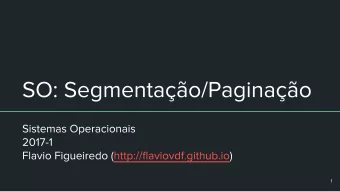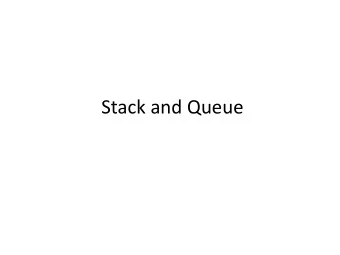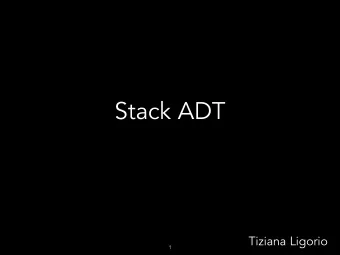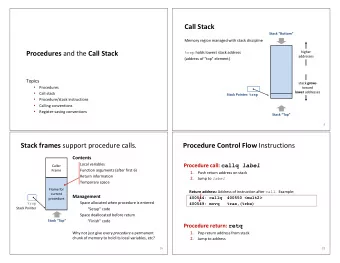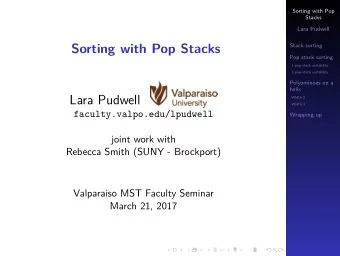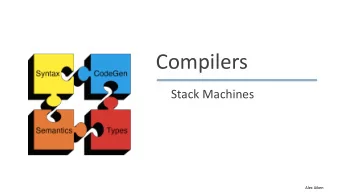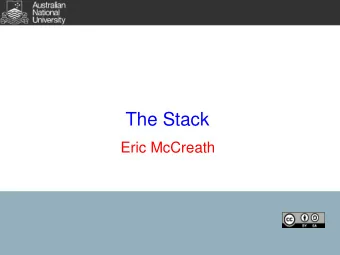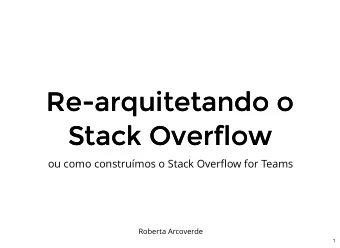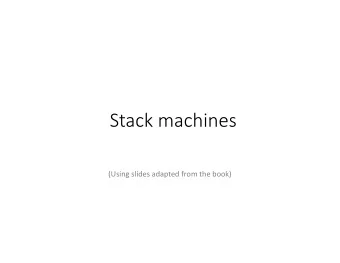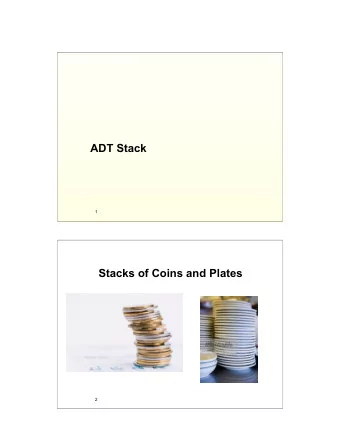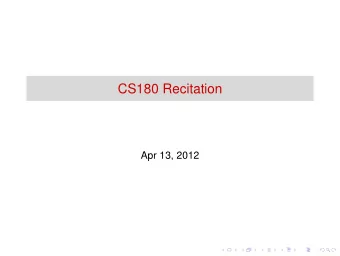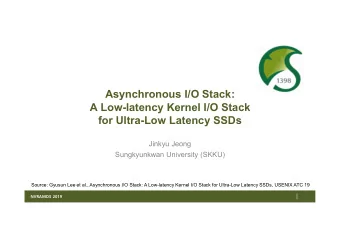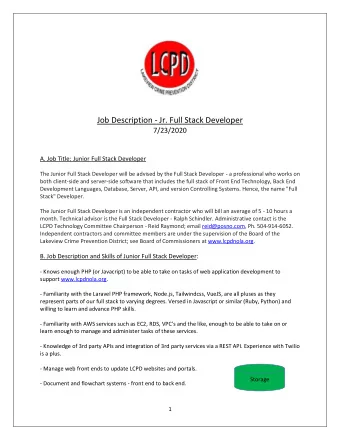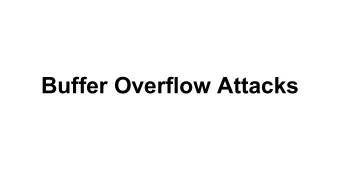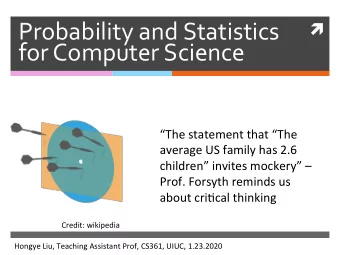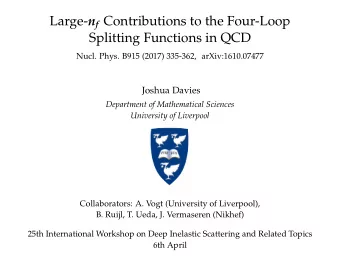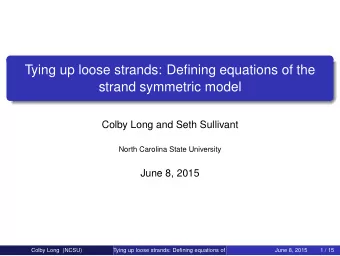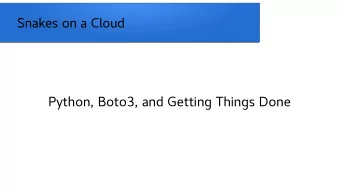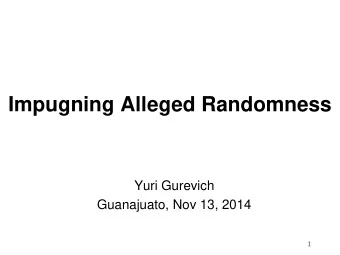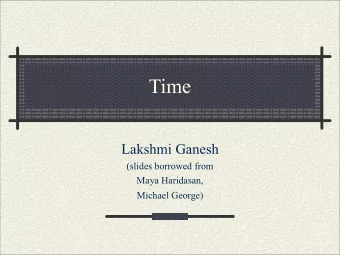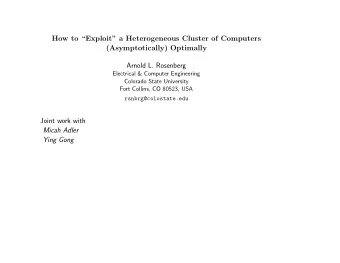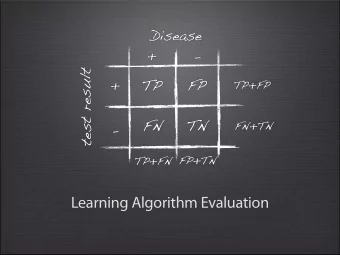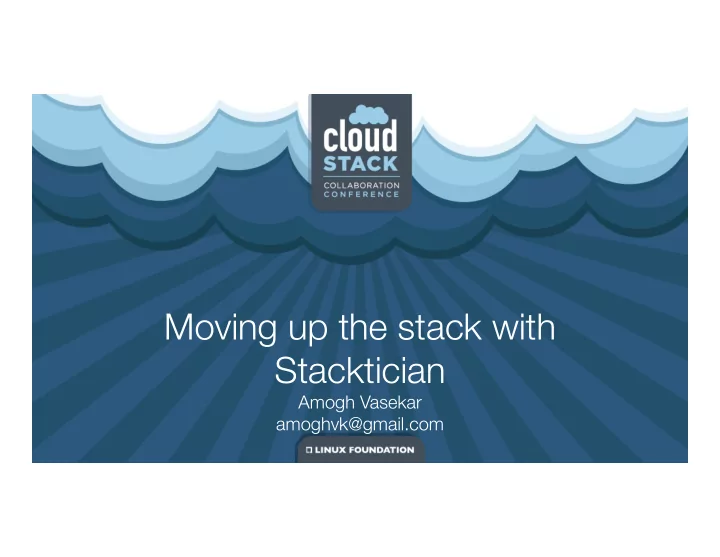
Moving up the stack with Stacktician Amogh Vasekar amoghvk@gmail.com - PowerPoint PPT Presentation
Moving up the stack with Stacktician Amogh Vasekar amoghvk@gmail.com Agenda Introduction History Architecture and Implementation Current State Enhancements Agenda Introduction History Architecture and Implementation
Moving up the stack with Stacktician Amogh Vasekar amoghvk@gmail.com
Agenda Introduction • History • Architecture and Implementation • Current State • Enhancements •
Agenda • Introduction History • Architecture and Implementation • Current State • Enhancements •
Introduction What is Amazon CloudFormation? Create and manage collection of related AWS resources • Typically, the resources will form your whole application “stack” • In essence, “Infrastructure-as-code” JSON file • Describe resources • Describe dependencies • Readable, reusable, reviewable •
Sample JSON template
Usefulness Single click application deployment for multiple users • Transparent, reusable • Ease of resource management and dependencies • Atomic deployments • Thus, migrate new business applications to “cloud” •
Simply put, CloudFormation for CloudStack J Web interface for template and stack management
Agenda Introduction • • History Architecture and Implementation • Current State • Enhancements •
History Started by @chiradeep • Introduced at CCC-13 as a prototype • Execute AWS CloudFormation templates on CloudStack *AS IS* AS IS* • Problem – low fidelity between A Pr oblem – low fidelity between AWS and WS and CloudStack CloudStack r resour esource ce • types ( types ( mor e on this later ) more on this later
Agenda Introduction • History • • Architecture and Implementation Current State • Enhancements •
Architecture Two components StackMate Execution engine for running the templates and interfacing with CloudStack • Stacktician Web interface • Embeds StackMate underneath •
StackMate in 2 mins Treat template = stack definition as workflow • Execute workflow by making appropriate CloudStack API calls • Core engine for executing templates, does the heavy lifting • Command line tool •
Stacktician in 2 mins Web UI for StackMate • Backed by database for persistence • Uses Ruby meta-programming to interface with StackMate •
Where we were last time… Resolve complex resource dependencies • Intrinsic functions • Wait Conditions • Create simple resources like AWS::Instance and AWS::SecurityGroup • using StackMate
AWS templates on CloudStack Simple resources work well • Too many differences in more complex resources like VPC and networks • Ø No route tables Semantic differences between APIs for same resources • Ø Different types of values for parameters Dependency resolution for CloudStack using AWS templates became too complex • Ø Sometimes, two AWS APIs act as a single one in CloudStack Ø CloudStack networking renders AWS options like DhcpOptions unnecessary Ø Too many NoOp resources used as work-around for above
CloudStack Namespace Instead create CloudStack specific namespace! • No more mapping of resources from AWS namespace to CloudStack • space Adds the ability to validate API parameters • Every CloudStack resource becomes a “participant” in the workflow • execution Essentially need to call create and delete APIs •
CloudStack Namespace Problems • Ø New resources added frequently (e.g tags, UCS, Nicira) Ø APIs evolve to support new parameters etc. Ø Too many CloudStack resources to maintain (~51) Solution • Ø Use API discovery Ø Auto generate code Ø Use API information to validate all required parameters exist / format of parameters
StackMate participants Bootstrap StackMate • Publish CloudStack version specific gem •
Errors and rollback Want stack creation to be atomic • But, provide an option to user to disable rollback (e.g. for debugging) • Ø Catch resource creation errors, and initiate rollback Ø Execute deletion in reverse order of dependencies Ø Skip any resources not yet created Ø If error while deleting, notify user (log for StackMate, UI status for Stacktician) Ø Stacktician injects additional code in StackMate for DB management
Metadata server Resources, like VMs, can launch additional initialization scripts upon configuration • Ø E.g. – Launch a script via “userdata” parameter Typically, script needs additional metadata to work with • Metadata is specific to a resource • Request metadata
Metadata server And expose retrieval as API
Metadata Server StackMate • In memory metadata, embeds a Sinatra server for waitcondition and metadata Stacktician • Rails serves metadata, persisted in DB (Special thanks to Simon Waterhouse for integrating cfn-init scripts and creating scripts for Windows)
Stacktician Scaling Improvements Ruby MRI has global interpreter lock. Eventually, allowed for only one • stack execution thread to run at a time Ø Use JRuby container, run in JRuby compatible server Async wait for stack : one thread per stack launch would overwhelm • server Ø GetBack gem for managing thread pool
Delete Stack Stacktician Resource IDs in database • Execute delete APIs in reverse order of dependency creation • Not fully tested yet • StackMate No DB, no IDs • Use resource tags to figure out resources, and delete • In progress •
Improvements StackMate Better logging, log level control • Light-weight CloudStack client for making API calls • Stacktician Supports REST-based API for stack operations, querying and manipulation • Command line tools for all the above operations • sm-create-stack, sm-create-template etc •
Agenda Introduction • History • Architecture and Implementation • • Current State Enhancements •
Demo
Agenda Introduction • History • Architecture and Implementation • Current State • • Enhancements
Future enhancements Better plugin architecture Allow creation of custom type of resources • Interface with other types of Clouds – GCE, AWS etc. • Allow for scenarios like resource A on CloudStack, B on AWS within single stack • Currently only in StackMate, and very rudimentary. Enforces some basic constraints, • uses tag “stackmate_participant = true” for discovery Ø Bad plugins rejected at run-time Needs more work to make robust •
Future enhancements Nested stacks • Ø Treat stack as first class object. Template can contain another stack definition as a resource Ø Works in StackMate, disabled for lack of good implementation • Support conditional functions in template (e.g Fn:And, Fn:Or, Fn:If) • Support update stack Ø Semantics to be well defined
Q & A Questions? Thoughts? Comments? Suggestions? https://github.com/stackmate https://github.com/stackmate Feel free to log issues – more the better! Big thanks to Chiradeep for all the help
Recommend
More recommend
Explore More Topics
Stay informed with curated content and fresh updates.
